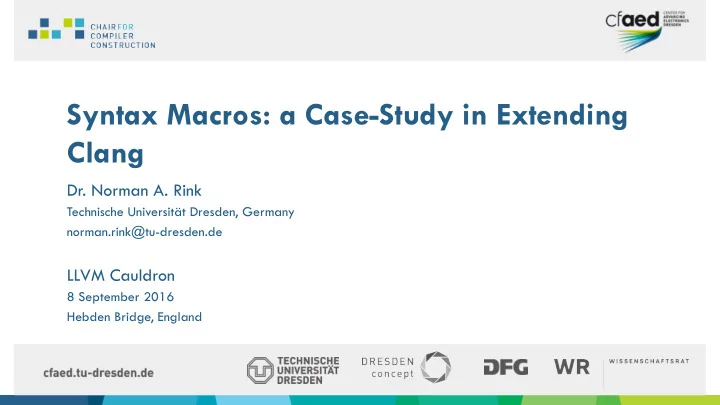

Syntax Macros: a Case-Study in Extending Clang Dr. Norman A. Rink Technische Universität Dresden, Germany norman.rink@tu-dresden.de LLVM Cauldron 8 September 2016 Hebden Bridge, England
Who we are Chair for Compiler Construction (since 2014) Prof. Jeronimo Castrillon Dr. Sven Karol code generation for multicore domain-specific languages (DSLs) q q systems-on-chip and tools dataflow programming models languages for numerical q q applications heterogeneous platforms q software composition q For more details and a full list of staff visit: https://cfaed.tu-dresden.de/ccc-about 2
Introduction Macros are the world’s second oldest programming language.* macros are a meta-programming tool q can be used to abstract programming tasks q reduce repetition of code patterns, esp. boilerplate code q “old” example: macro assembler q preprocessor (PP) macros q very widely used q textual replacement à no type safety, poor diagnostics (but improving) q syntax macros q expand to sub-trees of the AST (abstract syntax tree) q compose programs in the sense that ASTs are composed q compiler can check that the composed AST is valid q 3 *) D. Weise, R. Crew
Introduction – cont’ed SCALED_SUBSCRIPT(a, i, c) a[c*i] ArraySubscriptExpr PP macro syntax macro ‘int’ DeclRefExpr BinaryOperator ‘*’ ‘int *’ ‘int’ a DeclRefExpr DeclRefExpr typing of AST nodes enables ‘int’ ‘int’ à correctness checks q better diagnostics q c i reduced prone-ness to unintended behaviour q 4
Defining syntax macros signature macro name parameter names body $$[Expr] ADD (Expr[int] var $ IntegerLiteral[int] num) $$$var + $$$num macro definition parameter separator parameter instantiation 5
Using syntax macros int simple() { -FunctionDecl simple 'int ()' int x = 1; `-CompoundStmt x = $ADD(x $ 41); |-DeclStmt | `-VarDecl x 'int' return x; | `-IntegerLiteral 'int' 1 } |-BinaryOperator 'int' '=' | |-DeclRefExpr 'int' lvalue Var 'x' 'int' macro instantiation parameter separator | `-BinaryOperator 'int' '+’ | | `-ImplicitCastExpr 'int' <LValueToRValue> | | `-DeclRefExpr 'int' lvalue Var 'x' 'int' | `-IntegerLiteral 'int' 41 macro sub-AST `-ReturnStmt `-ImplicitCastExpr 'int' <LValueToRValue> `-DeclRefExpr 'int' lvalue Var 'x' 'int' 6
Summary of syntax macros Goal: use syntax macros instead of PP macros everywhere. q For safety and better diagnostics. q Are there any theoretical limitations to replacing PP macros? q Use cases: q Find (potential) errors in code that relies on PP macros. q Aid language designers in prototyping syntactic sugar. q Here: toy model used to study the extensibility of Clang. q Further suggestions welcome! q Reference: “Programmable Syntax Macros” (PLDI 1993) q by D. Weise, R. Crew q Describes a more comprehensive system than the prototype discussed here. q 7
How to parse macro definitions $$[Expr] ADD (Expr[int] var $ IntegerLiteral[int] num) $$$var + $$$num Parser Replace Parser by MacroParser in ParseAST . q virtual StmtResult Macro signature: q ParseStatementOrDeclaration(...); Look out for $$ at the beginning of a statement. q If $$ is present, parse the macro signature. q Otherwise, defer to statement parsing in base class Parser . q MacroParser Macro body: q StmtResult ParseStatementOrDeclaration(...) Look out for $$$ to indicate macro parameter expression. q override; Otherwise, defer to statement/expression parsing in Parser . q Very natural to use polymorphism to adjust the parser’s behaviour. 8
How to instantiate macros $ADD(x $ 41) Parser If $ at the beginning of an expression, q parse the macro parameters. q virtual ExprResult ParseExpression(...); instantiate the macro body’s AST with the parameters q pasted in. Otherwise defer to expression parsing in the base q MacroParser class Parser . ExprResult ParseExpression(...) override; Again, very natural to use polymorphism to adjust the parser’s behaviour. 9
How to instantiate macros – cont’ed $ADD(x $ 41) Sema No virtual methods needed since MacroParser knows q that it calls into MacroSema for constructing the AST. Subtlety: Placeholder node in the AST. q Required to represent (formal) macro parameters in the q MacroSema body AST. Must type-check that parameters are in scope in the q void ActOnMacroDefinition(...); macro body. Expr* ActOnMacro(...); Expr* ActOnPlaceholder(); Introduction of new AST nodes is tedious. 10
Problems with semantics and scope $$[Stmt] RET (Expr[int] var) return $$$var; Problem: return statements are only valid inside function scope. q If the macro is defined at global scope, Sema will silently produce an empty AST for the macro body. q $$[Expr] ADD_TO_X (Expr[int] var) x += $$$var Problem: x may not be bound correctly. q If x is in scope at the macro definition, it will be bound. à Binding may be incorrect at macro instantiation. q If x is not in scope, it is a free variable. à Sema will raise an error. q This is the “open scope problem”: What is a suitable scope for macro definitions? 11
Summary of extensibility issues problem/need solu.on benefit difficulty polymorphism of Parser make Parser virtual enables language extensions, easy, but may impact DSLs performance polymorphism of CodeGen make CodeGen virtual eases implementa;on of new easy, but may impact compiler flags performance new AST node types add generic sub-classes of makes the AST readily moderate, must integrate with Stmt , Expr etc. extensible, reduces boilerplate exis;ng infrastructure code required for prototyping adjust the behaviour of Sema enable extensions/DSLs with easy if doable by Scope class, to the parser’s context fully independent seman;cs moderate to hard otherwise “open context problem” separate Parser from Sema ? full extensibility of C/C++, hard including seman;cs Deliberate blank: How to support embedded semantics without fully separating Parser and Sema ? q Medium-term goal: Have a clean interface for adding language extensions to Clang. q 12
Source code for syntax macros Sources can be found on GitHub : Norman Rink https://github.com/normanrink q extended Clang: https://github.com/normanrink/clang-syntax-macros q compatible (vanilla) version of LLVM: https://github.com/normanrink/llvm-syntax-macros Please contribute: questions, bugs, patches, improvements all welcome! 13
Syntax Macros: a Case-Study in Extending Clang Dr. Norman A. Rink Technische Universität Dresden, Germany norman.rink@tu-dresden.de Thank you. Work supported by the German Research Foundation (DFG) within the Cluster of Excellence ‘Center for Advancing Electronics Dresden’ (cfaed).
Recommend
More recommend